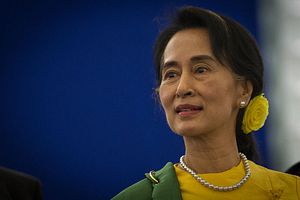The landslide victory of Aung San Suu Kyi’s National League for Democracy (NLD) in last Sunday’s elections is a turning point in Myanmar’ s history. The NLD will have an opportunity to rule alone, given its super majority in the national parliament.
How will an NLD government in Myanmar affect the country’s ties with China? Already, analysts are debating the possible impact of this new government on China-Myanmar relations. There are some legitimate worries that matters could deteriorate.
Some in China are worried that a new government, led by Suu Kyi, might choose to side with the U.S. and Japan in balancing against China. Because of its pro-democracy values and ideology, the NLD might find natural support from these countries. Of course, it is no secret that the U.S. and Japan are working hard to increase their influence in Southeast Asia, including in Myanmar. To a certain degree, China and Japan are also competing for influence and impact in Myanmar. The NLD, however, has not established a working relationship with China, thus leaving many Chinese experts concerned.
Such a view, though plausible, might be superficial if one looks closely at Myanmar’s political reality. A stable and effective China-Myanmar relationship, in the end, will only benefit both countries for a set of reasons.
To begin, despite the NLD’s overwhelming victory in the recent historic elections, the political reality is that the NLD and Suu Kyi cannot rule Myanmar easily and effectively by themselves. One important fact to bear in mind is that the army of Myanmar still controls 25 percent of the seats in parliaments. And there is always the possibility that the army might not respect the election results and even initiate a coup if things turn very ugly in the future. All this means that the NLD and Suu Kyi, despite their election victory, should not think they now have full control of Myanmar. In other words, the NLD should work closely with the army to maintain a stable domestic order by more or less respecting the core interests of the army and its generals. This is no easy task, especially under a democratic regime, but it is a necessary one if national reconciliation is the goal.
China, on the other hand, has already taken a pragmatic approach to Myanmar in recent years. Suu Kyi’s victory has long been anticipated by China. Her visit to China earlier this year is the best evidence that China has a flexible policy toward a democratic Myanmar. Indeed, as I have argued elsewhere, China is not worried about a democratic Myanmar seriously derailing China-Myanmar relations. China would prefer a stable and effective government in Myanmar as this would ensure China’s security and economic interests in the region.
Moreover, the claim that the U.S. and China are actively competing for influence in Myanmar is exaggerated. To some degree, one can make the argument that the U.S. and China are competing for influence at the global level, thus Myanmar would certainly be included in this grand chess game. However, such a claim neglects shared interests between the U.S. and China in Myanmar, indeed in the region as a whole. For instance, in 2014, China and the United States made a joint announcement that they would cooperate with Myanmar on several issues, including healthcare and development. Of course, such cooperation will always have its limits, but instances like this demonstrate that there is more to U.S.-China cooperation Myanmar than otherwise simplistic narratives would suggest.
To conclude, the view that the newly elected democratic government, led by Aung San Suu Kyi, will align with the United States in balancing or containing China is seriously misleading. Such a view also deeply underestimates the agency of the Burmese people, implying that they cannot choose an independent foreign policy for their country. Outside powers should not view Myanmar as a battleground for their own national interests. Instead, they should respect Myanmar’s right to govern itself. They should help Myanmar emerge as a more stable and peaceful country. This is what will allow both countries to benefit the most.
































